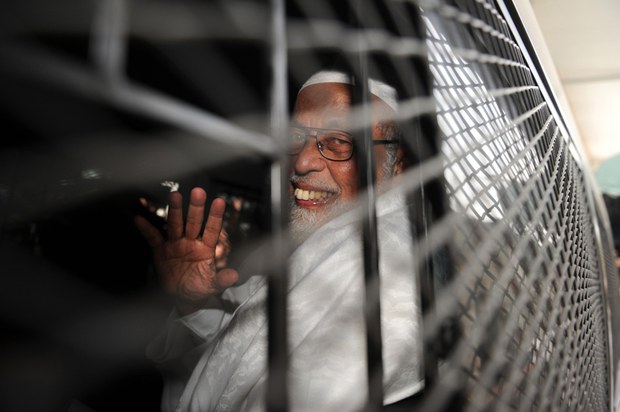Indonesia: Islamic Cleric’s Options to Leave Prison Fade
2016.08.19
Jakarta
 Indonesian cleric Abu Bakar Bashir waves from a police vehicle in Jakarta after his conviction on terrorism charges, June 16, 2011.
Indonesian cleric Abu Bakar Bashir waves from a police vehicle in Jakarta after his conviction on terrorism charges, June 16, 2011.
Updated at 8 a.m. ET on 2016-08-21
Radical cleric Abu Bakar Bashir is still revered among Indonesian militants, even as he spends his twilight years behind bars and is running out of legal options to have his 15-year prison term reduced.
The spiritual leader of militant group Jemaah Islamiyah, which carried out the 2002 Bali bombings that killed 202 people, recently lost an appeal against his 2011 conviction for financing a militant training camp in the remote mountains of Aceh province.
On July 27 Indonesia’s Supreme Court rejected his appeal after judges decided that they did not find fresh evidence to overturn his conviction. His lawyers argued that Bashir had meant to donate the money for a Palestinian cause and was unaware that the money he gave was instead used to finance the paramilitary training in Aceh.
On Wednesday, Indonesia’s Independence Day, President Joko “Jokowi” Widodo moved to reduce Bashir’s prison term by three months as part of sentence reductions handed out to thousands of convicts every year on the national holiday, the Associated Press reported.
Bashir turned 78 on the same day, and this was the second three-month reduction given to the cleric, according to AP.
A request to have more than one appeal is possible, according a Supreme Court circular, if the convict can present a new situation or evidence to support the claim.
Achmad Michdan, Bashir’s lawyer, said a second appeal was possible, pointing to an irregularity. He said the judges who ruled in the appeal were different than the panel appointed to review the case.
“We weren’t notified that there was a change. We are going to question this because this is odd and for us, this is a legal problem,” Achmad told BenarNews.
Supreme Court spokesman Suhadi confirmed that one of the three appointed judges, Artidjo Alkostar, recused himself after he realized he had served in a previous case against Bashir.
Terrorism analyst Rakyan Adibrata said he did not expect appeals to work, telling BenarNews that Bashir could leave prison if he lived long enough to complete his sentence.
Bashir revered
During his time in prison over the past five years, Bashir has resorted to pursuing appeals in Indonesia’s secular legal system that he despises, potentially hampering his credibility as a promoter of replacing the Indonesian government with an Islamic caliphate.
Bashir, who reportedly pledged his allegiance to the so-called Islamic State (IS) group from Nusakambangan prison in Central Java two years ago, remains a revered figure among Muslim militants in the country.
“Yes, he is, no doubt,” Rakyan said, adding that Bashir remains by far an irreplaceable, notable figure among extremist Muslims in the country.
Rakyan, who is with the ASEAN Parliamentarians for Human Rights, said that two rival militant factions in Indonesia were vying for Bashir’s endorsement to their respective views regarding IS.
The Jemaah Ansharut Tauhid (JAT) that Bashir founded, and another Muslim hardline group, Tauhid Wal Jihad, are supporters of IS.
Those in the non-supporting IS faction are the Indonesian Mujahideen Council (MMI), whose leader is Muhammad Thalib, and Jemaah Ansharusy Syariah (JAS). The second group was founded in 2014 by Bashir’s sons and his top aide in JAT, Muhammad Achwan, after Bashir said that those who did not support IS should leave JAT.
Rakyan said Bashir’s sons and Achwan wanted him to denounce his alliance with IS while the faction of supporters led by Aman wanted him to support Abu Bakr al-Baghdadi, the militant organization’s self-appointed Caliph, because Bashir remains a magnet to draw people to IS.
In April, Achmad told BenarNews that Bashir has denounced his allegiance to IS, saying he was misinformed about the militant group – but Bashir has not released any statement formally denouncing his support.
History of militancy
Bashir has had brushes with the authorities for his fundamentalist views since the era of President Suharto, who ruled from 1967 to 1998, when even aspiring to establish an Islamic state in Indonesia was considered subversive.
He was convicted in 2004 and sentenced to 30 months imprisonment for inciting the 2002 Bali bombings and the bombing of the J.W. Marriott Hotel in Jakarta a year later.
In December 2006, the Supreme Court overturned his conviction after he served out his first prison term.
After his second conviction in 2011, Bashir was sent to Nusakambangan, a penal island in Central Java’s Cilicap regency. This year, he was transferred to a prison in Bogor, West Java, so he could have better access to medical treatment, but he remains in isolation.
“Bashir is considered high risk because he has fanatical followers and it could be a problem if he tells them to attack anyone that stands in the way of their target to establish a new country,” Dinny Mutiah, whose master’s thesis at the Paramadina Graduate School of Diplomacy in Jakarta examined the flow of terror financing, told BenarNews.
According to terrorism analyst Taufik Andrie, who is executive director of the Institute for International Peacebuilding, the government should consider leniency to Bashir’s prison sentence for humanitarian reasons and in light of his need for medical care.
“But in terms of his ideology, who could limit one’s thoughts? At least it is unlikely that it would materialize into concrete, physical form such as planning or launching a terror attack,” said Andrie, who runs a program to help former convicted terrorist reintegrate into the society by starting small businesses.
An earlier version incorrectly identified the leader of Indonesian Mujahideen Council.







